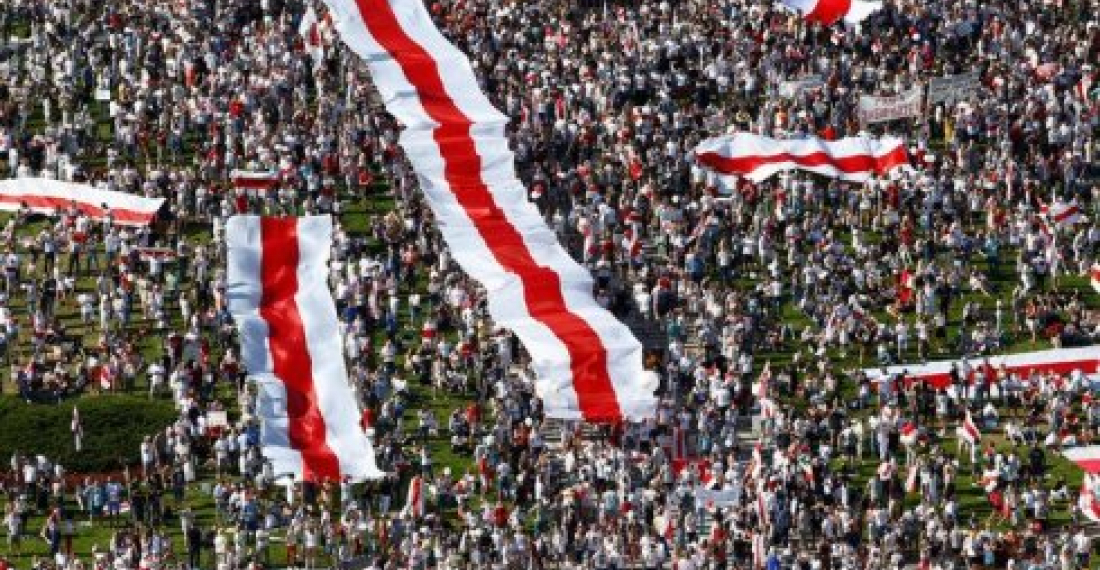Editorial Comment
For more than two decades Belarus, a country of ten million people surrounded by Russia to the East, Ukraine to the South and EU member states to the north and west, has been Europe's backwater - caught it seemed in a time-warp. Its leader, Alexander Lukashenko has ruled the country since 1994, with a strong hand. Though initially elected with a popular vote he subsequently stifled any opposition to his rule. It was he claimed, the price Belarusians were ready to pay in return for stability and predictability, and against the turmoil and excesses that followed the collapse of the USSR in 1991. Indeed Lukashenko even aspired to somehow revive the Union, when he and his Russian counterpart agreed to form a Union State - a project that never took off.
But instead of stability, the Belarusians ended with stagnation. The country became increasingly isolated and stuck in its Soviet past. The economy continued to be based on manufacturing under the control of state-owned enterprises, and main media channels have been loyal to the government. The KGB - still keeping its name from the Soviet past, remained one of the strongest institutions of the state.
The presidential elections held one week ago were at first seen as another rubber stamp exercise - one of several held over the last 26 years that have kept Lukashenko in power. But from early on it became clear that a new generation of Belarusians were not willing to accept things as before.
Despite the limitations imposed by the government, opposition candidates campaigned and gathered their supporters in their thousands. They managed to instil hope. Thus when the official results were announced giving Lukashenko more than 80% of the votes cast it was no surprise that many felt cheated and wanted to protest. The cruel suppression of peaceful protestors, and the subsequent reports of thousands being arrested and beaten up has now backfired on the government. On Sunday (16 August), what has been characterised as the biggest demonstration seen in the history of the country sent a clear message that the time for change cannot be postponed further. The modest turnout at Lukashenko's attempt at a counter demonstration was a clear sign that any popular base he may have had in the past was clearly eroded. What has tipped the balance it seems, were the workers in the large factories and industrial enterprises. They had been at the core of Lukashenko's support in the past. Now no more.
Lukashenko, for the moment, remains defiant. He has been trying to rally internal and external support, claiming that NATO is about to invade Belarus - a bizarre claim that however now appears to be the pretext for President Putin to come to Lukashenko's rescue. The two men are not the best of friends; their relationship in recent years has been difficult. Putin considers Lukashenko a very awkward ally, whilst Lukashenko often appeared to project the image of someone standing up to Putin (and Russian) bullying. It seems that for now differences are going to be put aside, at least for the moment.
Lukashenko needs Putin because he fears he is losing control of his forces of law and order. Anyone thinking of betraying him will now have to consider they may have to deal with the Russians too.
For Putin, this is a chance to bring Belarus fully back into the fold. His help to Lukashenko will come with a heavy price tag. Expect people closer to the Kremlin taking key positions in the government, and an end to Lukashenko's anti-Russian rhetoric.
Many however feel that Putin's help will not be enough to keep Lukashenko in power. Having overcome fear, and turned out in the streets in their tens of thousands, Belarusians are now motivated by hope of better times. Lukashenko's days as president are numbered.
What is important however is the transition and how it takes place. If Putin manages to persuade Lukashenko to leave quietly and hand over to a Kremlin loyalist, this may take the sting out of the immediate crisis, but will not satisfy the aspirations of the Belarusian people.
An interim government which has wide popular trust, should oversee new presidential elections as soon as possible. International meddling should be kept to the minimum, for the outcome needs to satisfy the people of Belarus, not Moscow, or Washington, or Brussels - nor for that matter Vilnius or Warsaw. But the European Union will have an important role to play as a counterbalance to Russian pressures, which we can already see coming. On Friday, the EU 27 foreign ministers started articulating their response to the situation in Belarus. A balance need to be struck between extending support and solidarity to the Belarusian people whilst not interfering directly in the political process which must be allowed to play its course.
We are seeing the awakening of the Belarusian people. Defying fear, they now see hope in the future. Their aspirations must be respected.
source: This is an editorial comment prepared by the editorial team of commonspace.eu
photo: Anti Lukashenko protestors in Minsk on 16 August 2020 called for the president's resignation and new elections.
Editorial Comments reflect the position of commonspace.eu. They do not necessarily reflect the opinion of our partners






